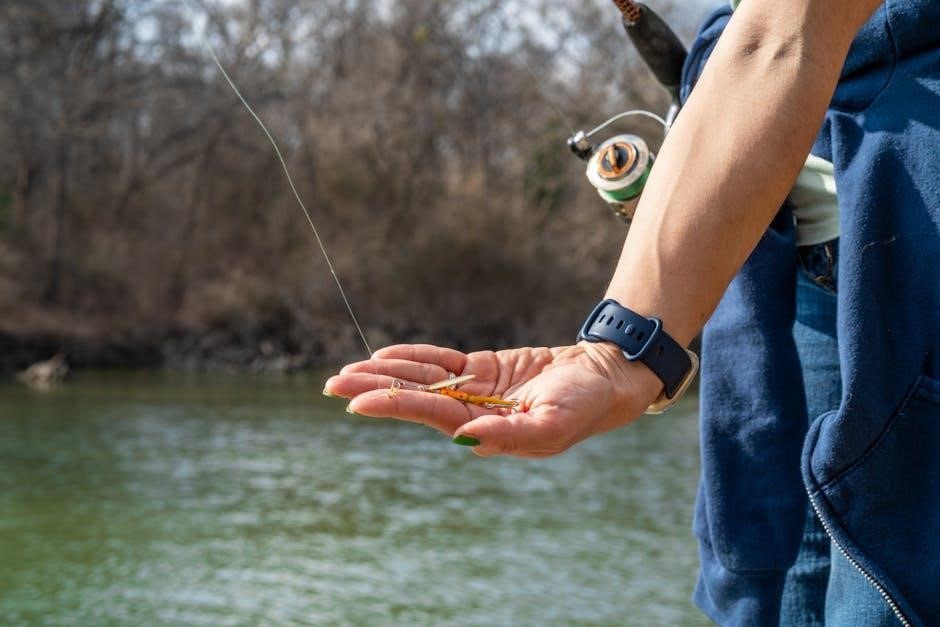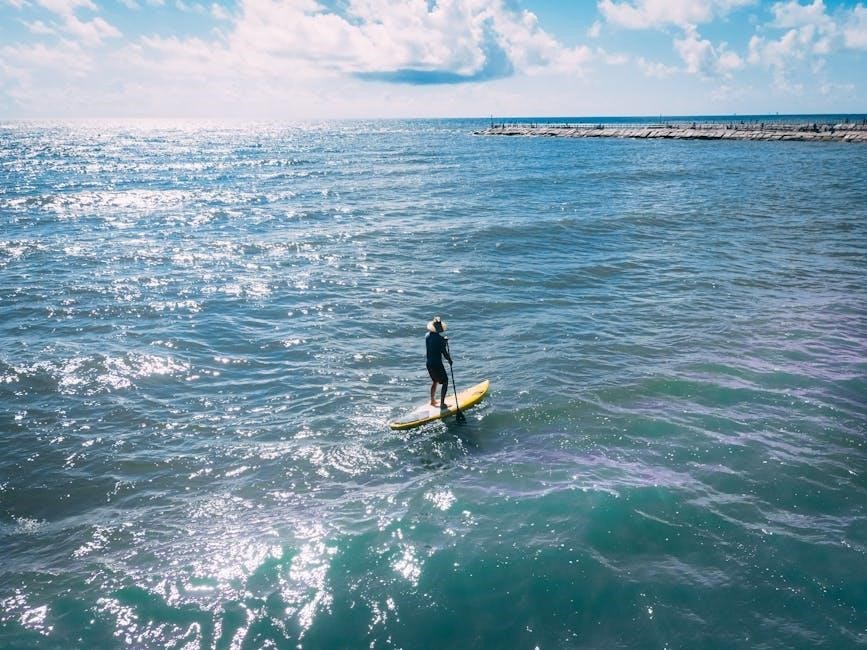
Texas offers exceptional fishing opportunities, from freshwater lakes to saltwater coastal areas․ A fishing guide license is essential for legally operating charter fishing trips in the state․
1․1 Overview of Fishing in Texas

Texas is renowned for its diverse fishing experiences, offering both freshwater and saltwater opportunities․ Lakes like Texoma are famous for Striper fishing, while the Gulf attracts anglers pursuing species like Tuna and Red Snapper․ The state’s vast waterways cater to both seasoned anglers and families, making fishing a popular outdoor activity․ With year-round fishing options, Texas ensures there’s always something to catch, supported by conservation efforts from the Texas Parks and Wildlife Department to maintain healthy fish populations and habitats․
1․2 Importance of Licensing for Fishing Guides
Licensing ensures compliance with state regulations, promoting sustainable fishing practices and conservation efforts․ It verifies guides’ knowledge of local waters, safety protocols, and legal requirements․ A license also reinforces accountability, protecting both clients and the environment․ By obtaining a license, guides demonstrate professionalism and commitment to ethical fishing practices, which are vital for maintaining Texas’s natural resources and ensuring a positive experience for anglers․

Types of Fishing Guide Licenses in Texas
Texas offers two primary types of fishing guide licenses: freshwater and saltwater․ Freshwater licenses cover inland lakes and rivers, while saltwater licenses require a Coast Guard captain’s license․
2․1 Freshwater Fishing Guide License

A freshwater fishing guide license is required for guiding trips on Texas’s inland lakes and rivers․ This license allows professionals to lead fishing charters in freshwater environments․ It is issued by the Texas Parks and Wildlife Department and does not require a Coast Guard captain’s license, unlike its saltwater counterpart․ The license ensures compliance with state fishing regulations and promotes sustainable fishing practices․ Guides must meet specific requirements to obtain this license, which is essential for operating legally in freshwater areas․
2․2 Saltwater Fishing Guide License
A saltwater fishing guide license is necessary for guiding fishing trips in Texas’s coastal waters․ This license requires applicants to hold a valid U․S․ Coast Guard captain’s license, ensuring they can safely operate a vessel․ It is issued by the Texas Parks and Wildlife Department and allows guides to lead charters in saltwater environments․ The license ensures adherence to marine regulations and promotes responsible fishing practices․ Obtaining this license involves meeting specific criteria, making it essential for operating legally in Texas’s saltwater fisheries․

Requirements for Obtaining a Fishing Guide License
Applicants must meet age and residency criteria, pass a background check, and obtain necessary safety certifications to qualify for a fishing guide license in Texas․
3․1 Age and Residency Requirements
To obtain a fishing guide license in Texas, applicants must be at least 18 years old․ Residency requirements vary, with Texas residents needing to provide proof of residency․ Non-residents may also apply but must meet specific criteria․ Certain exemptions apply, such as for individuals with intellectual disabilities or those under 17 years of age․ These requirements ensure that only qualified and eligible individuals can operate as fishing guides in the state․
3․2 Background Check and Safety Certifications
Applicants for a fishing guide license in Texas must undergo a background check․ Safety certifications, such as CPR/First Aid and boating safety, are mandatory․ These requirements ensure guides can handle emergencies and provide a safe experience for clients․ The Texas Parks & Wildlife Department verifies these certifications during the licensing process․ Compliance with these standards is essential for obtaining and maintaining a fishing guide license in the state․
3․3 Coast Guard Captain’s License for Saltwater Guides
A U․S․ Coast Guard Captain’s License is required for saltwater fishing guides in Texas․ This license ensures guides can legally and safely operate vessels in federal waters․ Applicants must present this certification when applying for a saltwater fishing guide license․ The Coast Guard License demonstrates competence in navigation, safety, and vessel management, which is critical for guiding clients in marine environments․ This requirement is specific to saltwater operations and does not apply to freshwater guides․
Examination Process for Fishing Guides
The exam includes a written and practical section․ Applicants must pass both to obtain certification․ The written exam covers fishing regulations, laws, techniques, and safety practices․
4․1 Written Exam Details
The written exam assesses knowledge of Texas fishing regulations, state laws, and safe practices․ It includes questions on species identification, bag limits, and environmental conservation․ A passing score is required to proceed to the practical exam․
4․2 Practical Exam Requirements
The practical exam evaluates hands-on skills essential for guiding fishing trips․ Applicants must demonstrate proficiency in tasks such as baiting hooks, casting, and navigating waterways․ Additionally, they are assessed on their ability to manage clients, ensure safety, and apply best practices during a fishing excursion․ This portion ensures that guides can effectively lead and safeguard clients while adhering to Texas fishing regulations and promoting a positive outdoor experience․

Costs and Fees Associated with Fishing Guide Licenses
Understanding the costs and fees for a fishing guide license in Texas is crucial․ Resident and non-resident license fees vary, with freshwater and saltwater licenses priced differently․ Additional fees may include application costs, exam fees, and renewal charges․ Saltwater guides must also obtain a Coast Guard Captain’s License, adding to the overall expense․ Continuing education fees may apply for license renewal․ It’s advisable to check with the Texas Parks and Wildlife Department for the most accurate and up-to-date pricing information․

Application Process for Fishing Guide License
To obtain a fishing guide license in Texas, applicants must submit a completed application form to the Texas Parks and Wildlife Department․ Required documents include proof of residency, a valid ID, and safety certifications․ A non-refundable application fee is also necessary․ Applicants must pass both written and practical exams․ Additional steps may include a background check․ Once approved, the license is issued, allowing guides to legally operate fishing charters in Texas․ For detailed instructions, visit the TPWD website or contact their office directly․
Renewal and Continuing Education Requirements
Texas fishing guide licenses must be renewed annually, typically starting August 15 for the upcoming season․ Renewal applications can be submitted online or through the Texas Parks and Wildlife Department․ Guides must complete continuing education courses to stay updated on safety protocols, fishing regulations, and environmental conservation․ These courses ensure guides maintain high standards and provide safe, ethical fishing experiences for clients․ Renewal fees apply, and licenses are valid from the date of issuance until August 31 of the following year․

Additional Considerations for Fishing Guides
Insurance, liability coverage, and client safety are critical․ Guides must ensure proper equipment, safety protocols, and adherence to fishing regulations to provide ethical and responsible fishing experiences․
8․1 Insurance and Liability Coverage
Insurance is crucial for fishing guides to protect against accidents, injuries, or equipment damage․ Liability coverage ensures financial protection if clients are injured or property is damaged․ Guides should invest in comprehensive insurance policies that cover medical expenses, legal fees, and lost revenue․ Additionally, many charter businesses opt for specialized insurance to protect their boats, gear, and operations․ Having adequate insurance not only safeguards the guide but also builds client trust, ensuring a safe and secure fishing experience for all parties involved․

8․2 Client Safety and Best Practices
Ensuring client safety is paramount for fishing guides․ Best practices include conducting safety briefings, providing life jackets, and maintaining first aid kits․ Guides should stay informed about weather conditions and water hazards to prevent accidents․ Implementing catch-and-release techniques and promoting sustainable fishing practices also fosters environmental responsibility․ Additionally, guides should encourage clients to follow local regulations and respect marine life․ By prioritizing safety and ethical practices, guides create a positive and secure fishing experience for their clients while protecting Texas’s natural resources for future generations․
Obtaining a Texas fishing guide license is a crucial step for anyone aiming to lead fishing charters in the state․ With its diverse waterways and abundant fish populations, Texas offers unparalleled opportunities for both freshwater and saltwater fishing․ By adhering to licensing requirements and upholding safety and conservation practices, guides play a vital role in preserving the state’s natural resources․ This license not only ensures legal compliance but also promotes responsible fishing, inspiring a deeper appreciation for the sport and the environment it depends on․